The Best Kitchen Layouts for Every Style and Size
Key Points Optimizing your kitchen layout enhances both functionality and style, catering to the multifaceted uses of modern kitchens, from cooking...
7 min read
.png) Ranney Blair
:
Nov 23, 2023 2:00:00 PM
Ranney Blair
:
Nov 23, 2023 2:00:00 PM
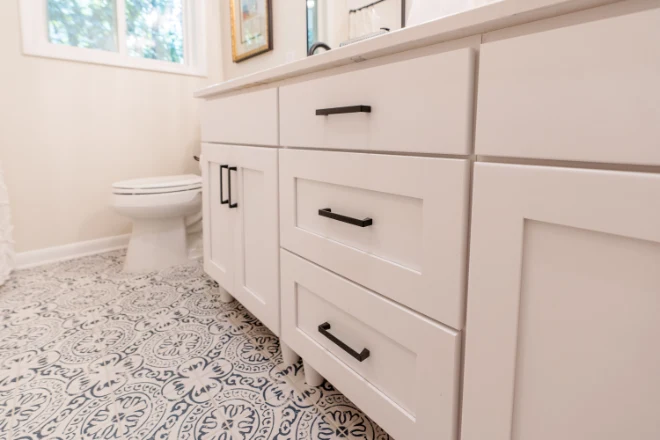
Ever stepped into a bathroom and felt the cold, unwelcoming touch of the floor on your bare feet?
Or perhaps you've slipped on a floor that looked beautiful but lacked practicality?
These are common challenges homeowners face when choosing bathroom flooring.
In this guide, we'll explore the best bathroom flooring options available in Atlanta, weighing their pros and cons.
By the end, you'll be equipped to make an informed decision the next time you take on bathroom remodeling in Atlanta.
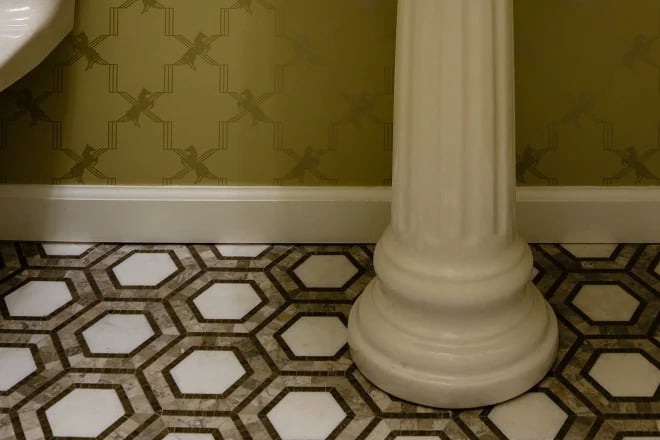
Often hailed as the champion of bathroom flooring, both porcelain and ceramic tiles are known for their waterproof nature, style, and cost-effectiveness.
Bathroom floor tiles have been a staple in bathrooms for decades, not just for their functionality but also for the elegance they bring to the space.
At a glance, porcelain tile and ceramic tile might seem interchangeable.
However, there are subtle differences.
Porcelain tile is crafted from a more refined clay and fired at higher temperatures, making it denser and less porous than ceramic.
This means that porcelain tiles are more resistant to moisture and stains, making them ideal for bathroom floors in areas like Atlanta, where humidity can be a concern.
Pros:
Diverse style choices: Whether you're aiming for a modern minimalist look, a rustic charm, or a vintage vibe, there's a tile design to match. Their ability to mimic the appearance of natural stones, wood, and even fabric gives homeowners a plethora of design options without compromising on durability. You can explore the latest tiling designs here.
Enhances home resale value: Bathrooms with quality tile work often appeal more to potential buyers, as they perceive it as a sign of a well-maintained home. You can learn more about budgeting for bathroom tiles here.
Compatible with radiant heating systems: For those who dread the cold touch of tiles in the morning, integrating radiant heating systems with these tiles can provide a warm, cozy feel.
Easy to clean and maintain: Their smooth surface makes them resistant to dirt, stains, and allergens, ensuring a hygienic bathroom environment.
Cons:
Can feel cold underfoot without radiant heating: Especially during colder months, tiles can feel chilly, which might not be pleasant for everyone.
Hard surface can be uncomfortable for extended standing: If you spend a lot of time standing in the bathroom, the hardness of the tiles might cause discomfort.
Can sometimes appear too sterile: Depending on the design and color chosen, some tiles can give off a too-clean or impersonal vibe.
Potential slip hazard if not chosen wisely: Especially when wet, tiles can be slippery. It's crucial to choose tiles with a bit of texture or matte finish for bathrooms to prevent accidents.
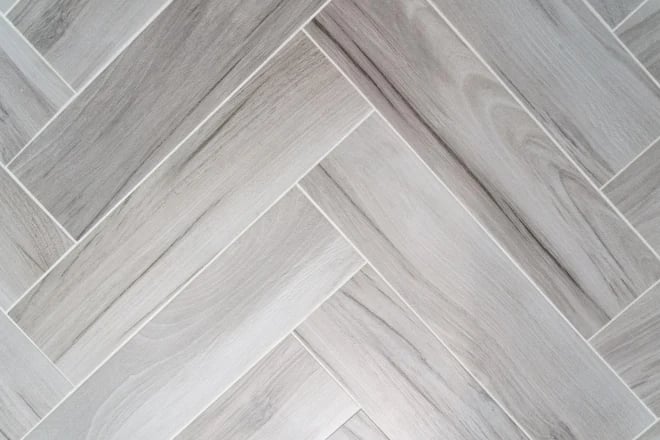
Vinyl flooring, especially in its luxury vinyl plank (LVP) and luxury vinyl tile forms, has been a go-to choice for homeowners for many decades.
The evolution of vinyl plank flooring over the years has made it even more appealing, combining the best of durability with aesthetic appeal.
The material's adaptability means it can mimic a variety of high-end materials, from hardwood to stone, giving homeowners the luxury look without the luxury price tag.
Pros:
Completely waterproof: One of vinyl's standout features is its resistance to water, making it perfect for wet areas like bathrooms.
Wallet-friendly: Compared to other flooring options, vinyl offers a cost-effective solution without compromising on quality or appearance.
DIY-friendly installation: For the hands-on homeowner, vinyl tiles and planks often come with easy-to-install features like click-lock systems, eliminating the need for adhesives.
Cushioned feel reduces slip-and-fall accidents: Unlike harder materials, vinyl has a softer, more forgiving surface. This not only provides comfort underfoot but also offers a safer, slip-resistant surface, especially when wet.
Wide range of designs to choose from: Modern vinyl flooring comes in an array of colors, patterns, and styles, allowing homeowners to customize their space to their liking.
Cons:
Professional installation recommended for expansive bathrooms: While DIY is possible, larger spaces might benefit from the expertise of a professional to ensure longevity and a flawless finish.
Imperfections can arise if the underlayment isn't smooth: Vinyl is flexible, which means any bumps or gaps in the underlayment can show through over time.
Challenging to repair if damaged: While vinyl is durable, if a plank or tile gets damaged, it often requires replacing the entire piece rather than a simple spot repair. This can be a bit more labor-intensive compared to other flooring types.
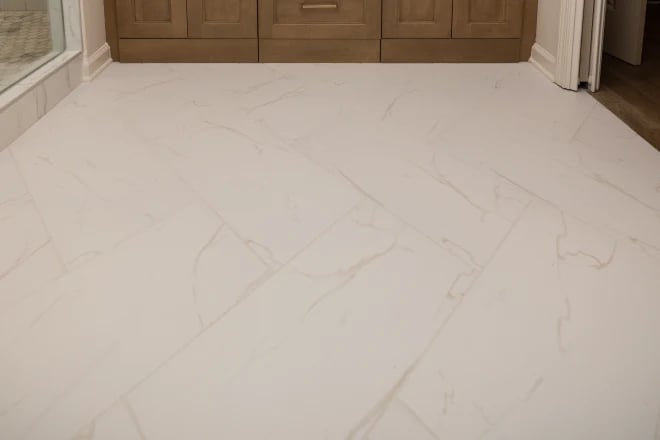
Natural stone flooring is synonymous with opulence and timeless beauty.
It's a testament to nature's artistry, with each piece being unique in its patterns and hues.
From the rustic charm of travertine tile and the earthy tones of limestone to the regal elegance of marble and the robustness of granite, natural stone offers a spectrum of options to fit various aesthetic preferences.
Check out our flooring comparison blog if you're debating porcelain or ceramic tiles vs. stone for your bathroom flooring.
Pros:
Boosts home resale value: Homes with natural stone flooring often command higher prices in the market, as buyers appreciate the quality and the upscale ambiance it brings to a space.
Exudes a luxurious feel: There's an undeniable allure to natural stone. Its intricate patterns, combined with its natural coolness underfoot, make it a favorite bathroom flooring option for those seeking sophistication.
Highly durable: When properly maintained, natural stone can last for decades, if not centuries. It's resistant to wear and tear, making it ideal for high-traffic areas.
Cons:
Pricier than other options: The extraction, processing, and transportation of natural stone make it one of the more expensive flooring choices. However, many homeowners see it as a long-term investment in their property's value and aesthetic appeal. You can explore bathroom flooring costs here.
Not a DIY-friendly installation: Laying natural stone tiles requires expertise to ensure they are level, properly spaced, and securely set. It's a task best left to professionals to avoid costly mistakes.
Requires periodic resealing to maintain its waterproof nature: While natural stone is inherently strong, it's also porous. This means that liquids can seep into the stone, leading to staining or damage. Regular sealing helps create a protective barrier, preserving the stone's beauty and preventing moisture-related issues.
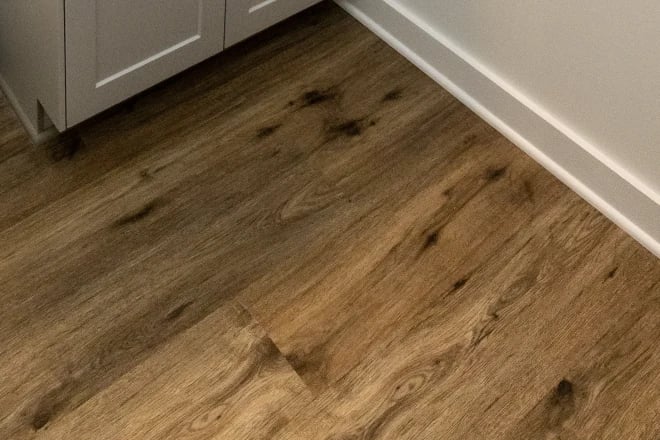
Engineered wood is a modern marvel in the flooring industry, bridging the gap between the classic allure of hardwood and the practical needs of today's homes.
Unlike traditional solid wood, which is made from a single piece of timber, engineered wood is constructed using multiple layers.
The top layer showcases the desired wood species, while the underlying layers, often made of plywood or high-density fiberboard, provide stability and resistance to moisture.
Pros:
Authentic wood appearance: Engineered wood flawlessly mimics the look and feel of solid hardwood, giving homeowners the aesthetic they desire without the associated challenges.
Stable in varying conditions: Thanks to its multi-layered construction, engineered wood is less susceptible to changes in humidity and temperature. This means fewer worries about warping, shrinking, or expanding, especially in fluctuating climates.
Cons:
On the expensive side: While engineered wood is generally more affordable than solid hardwood, it's still pricier than some other flooring options. However, its longevity and aesthetic appeal often justify the investment.
Limited to a few sandings before the veneer layer is compromised: One of the advantages of solid hardwood is the ability to sand and refinish it multiple times. With engineered wood, the top veneer layer is thinner, limiting the number of times it can be refinished. Homeowners should be cautious about sanding to avoid exposing the underlying layers.
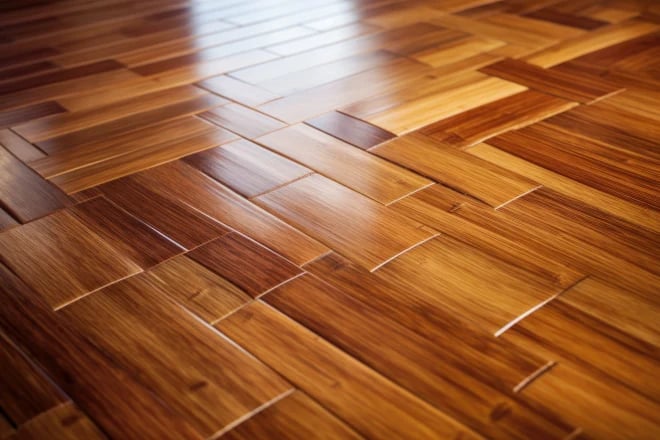
Bamboo flooring, while not technically a wood, has surged in popularity in recent years due to its sustainable nature and unique aesthetic.
Made from the bamboo plant, a fast-growing grass, this flooring option is both eco-friendly and robust.
Its fibers are tightly woven and compressed to create planks that rival the strength of traditional hardwoods.
Pros:
Unique and eye-catching appearance: Bamboo flooring offers a distinct grain pattern and color variation, setting it apart from typical hardwoods. Its natural tones can range from pale yellows to deeper ambers, adding warmth and character to any space.
Eco-friendly choice: Bamboo plants mature in just 3-5 years, making them a renewable resource. Their rapid growth rate means less deforestation, contributing to a more sustainable and environmentally friendly flooring option.
Durable and resistant to moisture: Bamboo's natural composition gives it an edge over many hardwoods when it comes to resisting moisture, making it a suitable choice for areas with higher humidity.
Cons:
Not entirely waterproof: While bamboo handles moisture better than some woods, it's not 100% waterproof. Prolonged exposure to water can lead to warping or discoloration.
Cannot be refinished: Unlike hardwoods, bamboo floors can't be sanded down and refinished multiple times. This limits their lifespan, especially if they experience significant wear and tear.
Requires specific cleaning agents: Bamboo floors can be sensitive to certain chemicals. It's essential to use bamboo-specific cleaners or neutral pH cleaners to maintain their luster and prevent damage.
Lower quality versions are prone to scratches: As with any product, there are varying grades of bamboo flooring. Cheaper, lower-quality options might not be as durable and can be more susceptible to dents and scratches. It's crucial to invest in high-quality bamboo to ensure longevity and resistance to wear.
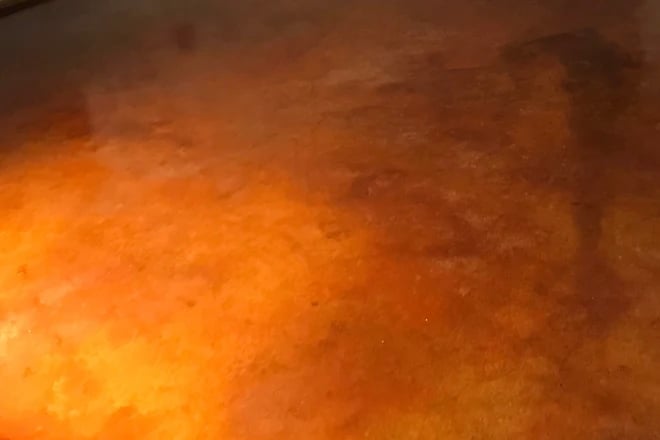
Stained concrete, often associated with contemporary and industrial design aesthetics, is gaining traction among homeowners seeking a unique and low-maintenance flooring option.
By applying a stain to the concrete, a myriad of colors and designs can be achieved, ranging from subtle earth tones to vibrant hues, allowing for customization to fit any interior style.
Pros:
Fully waterproof: One of the standout features of stained concrete is its imperviousness to water, making it an ideal choice for areas prone to spills or moisture.
Easy to clean: With its smooth surface, stained concrete doesn't harbor dust or allergens. A simple sweep or mop will keep it looking pristine.
Durable and long-lasting: Concrete is known for its resilience. When stained and properly sealed, it can withstand heavy foot traffic, pets, and daily wear and tear for years without showing signs of aging.
Cons:
Can be on the pricier side: While the raw materials might be inexpensive, the labor and expertise involved in staining and finishing the concrete can drive up costs.
Needs sealing to prevent porosity: While staining adds color, it's the sealing process that locks it in and prevents moisture from penetrating the concrete. Regular resealing is essential to maintain its waterproof nature and vibrant color.
Can feel cold and slippery: Especially in cooler climates, concrete can feel chilly underfoot. Additionally, if not finished with a textured or matte sealer, it can become slippery when wet.
Extremely hard surface: While its hardness contributes to its durability, it can be uncomfortable for extended standing or walking, and dropped items are more likely to break upon impact.
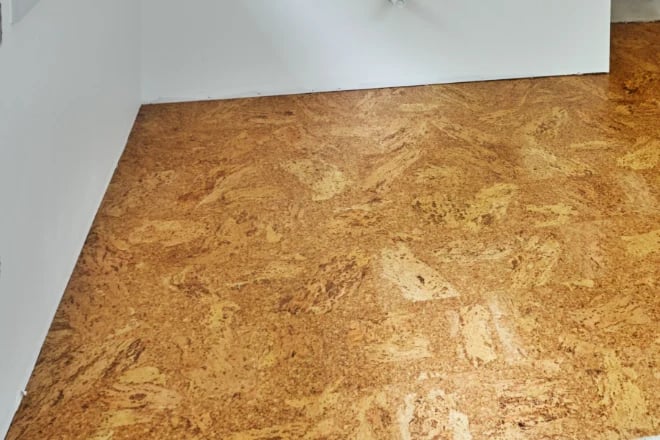
Derived from the bark of the cork oak tree, cork flooring is a testament to nature's ingenuity.
It's a renewable resource, as the bark regrows after harvesting, making it a favorite among environmentally-conscious homeowners.
Beyond its green credentials, cork offers a unique set of benefits and characteristics that set it apart from traditional flooring materials.
Pros:
Water-resistant: Cork's cellular structure naturally repels water, making it resistant to spills and minor moisture. This property also contributes to its suitability for bathrooms or kitchens.
Environmentally friendly: The cork harvesting process is sustainable, as trees are not cut down. Instead, only the bark is stripped, which then regenerates over time, ensuring the longevity of the cork forests.
Naturally resists mold and mildew: Cork contains a substance called suberin, which acts as a natural barrier against mold, mildew, and pests, promoting a healthier indoor environment.
Cons:
Can warp if exposed to standing water: While cork is water-resistant, it's not waterproof. Prolonged exposure to standing water can cause the material to swell or warp.
Shape can be affected by humidity: Cork is sensitive to changes in humidity. In extremely humid conditions, it can expand, and in dry conditions, it can contract. It's essential to maintain a stable indoor environment to prevent these issues.
Softer than other materials: The very feature that makes cork comfortable underfoot – its softness – also means it's more susceptible to dents and scratches from heavy furniture or high heels. Protective pads and regular maintenance can help mitigate this.
In wrapping up, the right bathroom flooring can elevate the look, feel, and functionality of your space.
With the insights provided, you're now better equipped to make a choice that suits your Atlanta home.
Remember, Ranney Blair Weidmann is here to handle all your bathroom remodeling needs.
Ready to transform your bathroom?
Fill out our contact form today, or give us a call. We're here to help!
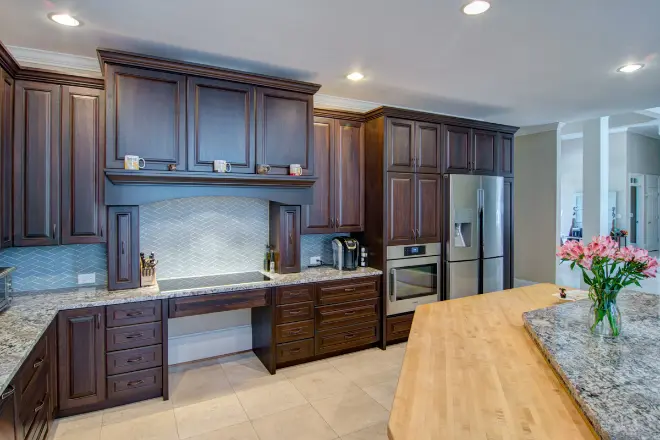
Key Points Optimizing your kitchen layout enhances both functionality and style, catering to the multifaceted uses of modern kitchens, from cooking...
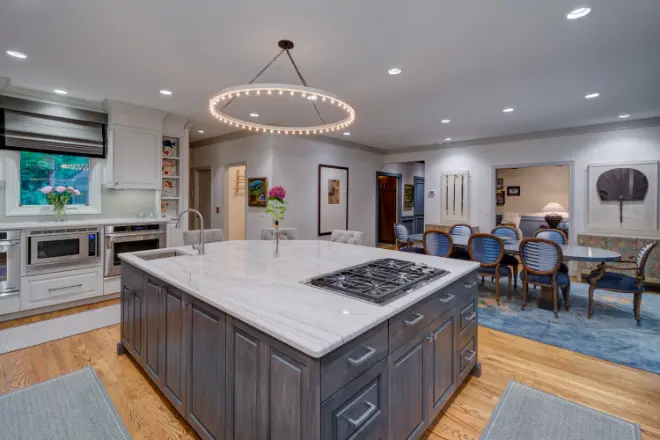
Key Points Open-concept kitchens enhance social interaction, natural light, and flexibility, redefining living experiences by merging kitchen,...
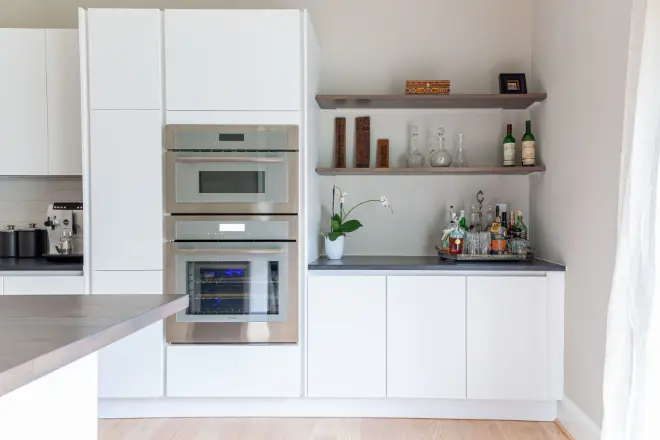
A Fresh Spin on Kitchen Updates Have you ever found yourself staring at your kitchen appliances, wondering if it's time for an upgrade? Or maybe...
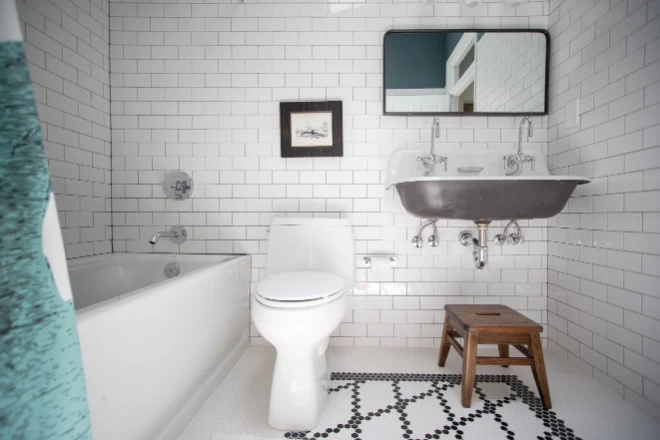
11 min read
Unraveling the Best for Your Bathroom: Vinyl vs. Ceramic Ever stood on a cold bathroom floor in the middle of winter, wishing for a warmer touch...
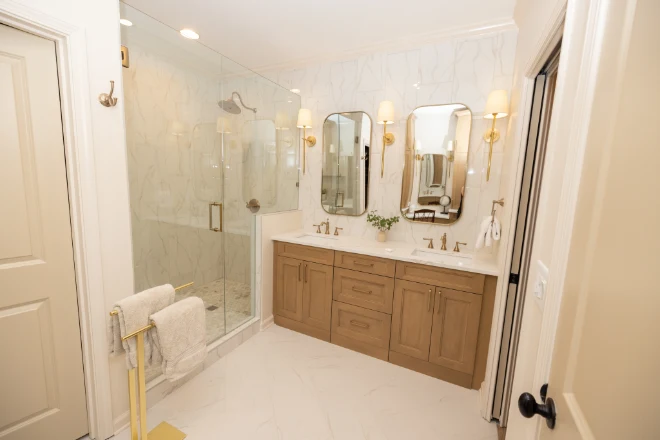
11 min read
Lighting Your Way to a Dream Bathroom Ever stood in your bathroom and thought, "Why does my vanity lighting make everything look so... off?" Or...
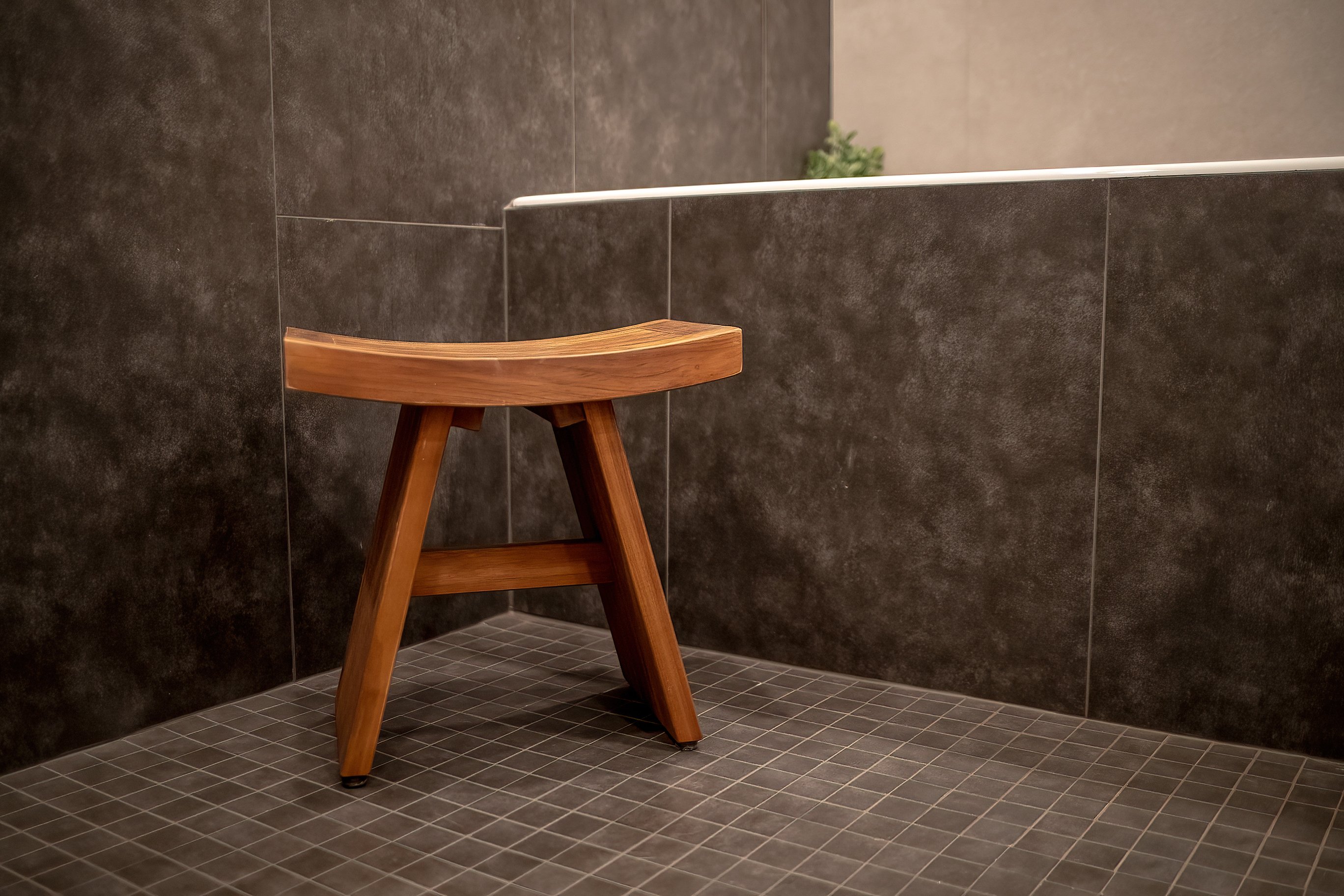
11 min read
Are you dreaming of a bathroom renovation but unsure about the cost of tiles? Do the numerous tile options and their varying prices make you feel...